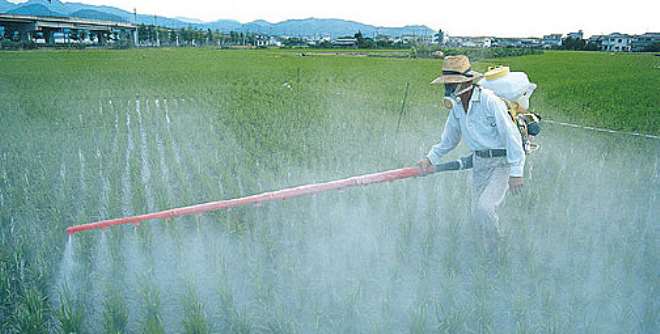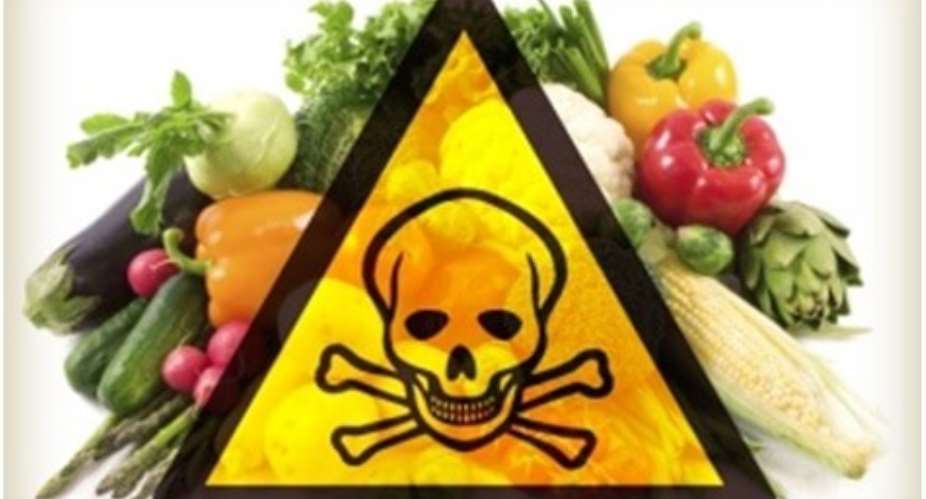Ghana Standards Authority (GSA) recently revealed the results of a research they conducted from 2013 to 2014: vegetables and fruits on the Ghanaian market do not contain an alarming proportions of pesticide residues. However, a Senior Officer with the authority further disclosed that 26% (in Greater Accra region) and 9% (in Ashanti region) of these sampled foodstuffs had insecticides residue above the acceptable level.
Pesticides by their nature can be detrimental to man. Even so, children, pregnant women, sick and aging people are usually more vulnerable to the effects of pesticides exposure.
According to the World Health Organisation (WHO), “pesticides may induce adverse health effects including cancer, effects on reproduction, immune or nervous systems”.
On May 17th, 2010, an article published on CNN.com, showed that children who are frequently exposed to a small amount of organophosphates pesticide in food, are more likely to have ‘attention deficit hyperactivity disorder’ than children who have been exposed less often.
Exposure to these same pesticides has also been associated with behavior and learning problems in children; they have been shown to affect the central nervous system.
According to a US journal, Environmental Health Perspectives, growing evidence shows that pesticides found in commercially grown food can be linked to some cases of breast cancer.
Pesticide residue in our food
Pesticide residues tend to decline as the pesticide breaks down over time, and diminish as the produce are harvested, transported, exposed to light, washed, processed, cooked and prior to sale. Ordinarily, by the time food reaches our tables, pesticide residues are generally below the acceptable threshold.
However, some farmers, intentionally and unintentionally, use pesticides and other agro-chemicals on their farms in unfitting manner, at the blind spots of the authorities and the general populace. These inappropriate practices increase the chemical load in the harvested food produce, far above the acceptable threshold, rendering such produce unfit for consumption.
Although authorities (such as the EPA, GSA, FDA, MoFA) regulate and enforce pesticide usage and its residual amounts in/on our foods to safeguard public health, we can lend a mutual beneficial supportive hand.
Minimizing the risks to pesticides exposure in your food
To prevent, we say, is better than to cure. By following these tips, you can, in your own capacity, minimize the exposure of pesticide in/on the food you eat:
- Eat a variety of foods, from different sources/sellers. This reduces the likelihood of exposure to a single pesticide.
- Wash thoroughly your food produce, preferably under running water. Scrub firm fruits and vegetables; this helps remove traces of pesticides (agro-chemicals) and germs from the surface and crevices of food produce. For grains and cereals, one may opt to rinse them twice or more, by changing the water.
- Not all pesticide residues can be removed by washing. Therefore when possible, discard the outer layers of leafy vegetables, such as lettuce or cabbage. Also, peel fruits and other foodstuffs whenever possible.
- The use of dish soaps or detergent in washing fruits and vegetables is not highly recommended because they can get trapped or absorbed by pores on the food, becoming difficult to rinse them off.
- Trim and discard fat and skin from meat, poultry, and fish to minimize pesticide residue that might have accumulated in the fat.
- You may consider having a backyard garden. This will allow you to control which pesticides, if any, are used on the food you cultivate and eat.
- Since many consumers cannot grow their own food, buying your produce from your local farmers/market can be a suitable alternative. This way, you can speak directly to the farmers/traders about their pesticide applications, before purchasing their foodstuffs.
- Especially for systemic pesticides (which might have been absorbed into the food produce), storing food produce for days to few weeks help reduce the residue of some pesticides, as these pesticides naturally break down to harmless form with time
 A Farm Being Sprayed
A Farm Being Sprayed





 Former Kotoko Player George Asare elected SRC President at PUG Law Faculty
Former Kotoko Player George Asare elected SRC President at PUG Law Faculty
 2024 elections: Consider ‘dumsor’ when casting your votes; NPP deserves less — P...
2024 elections: Consider ‘dumsor’ when casting your votes; NPP deserves less — P...
 You have no grounds to call Mahama incompetent; you’ve failed — Prof. Marfo blas...
You have no grounds to call Mahama incompetent; you’ve failed — Prof. Marfo blas...
 2024 elections: NPP creates better policies for people like us; we’ll vote for B...
2024 elections: NPP creates better policies for people like us; we’ll vote for B...
 Don’t exchange your life for wealth; a sparkle of fire can be your end — Gender ...
Don’t exchange your life for wealth; a sparkle of fire can be your end — Gender ...
 Ghana’s newly installed Poland train reportedly involved in accident while on a ...
Ghana’s newly installed Poland train reportedly involved in accident while on a ...
 Chieftaincy disputes: Government imposes 4pm to 7am curfew on Sampa township
Chieftaincy disputes: Government imposes 4pm to 7am curfew on Sampa township
 Franklin Cudjoe fumes at unaccountable wasteful executive living large at the ex...
Franklin Cudjoe fumes at unaccountable wasteful executive living large at the ex...
 I'll 'stoop too low' for votes; I'm never moved by your propaganda — Oquaye Jnr ...
I'll 'stoop too low' for votes; I'm never moved by your propaganda — Oquaye Jnr ...
 Kumasi Thermal Plant commissioning: I pray God opens the eyes of leaders who don...
Kumasi Thermal Plant commissioning: I pray God opens the eyes of leaders who don...
